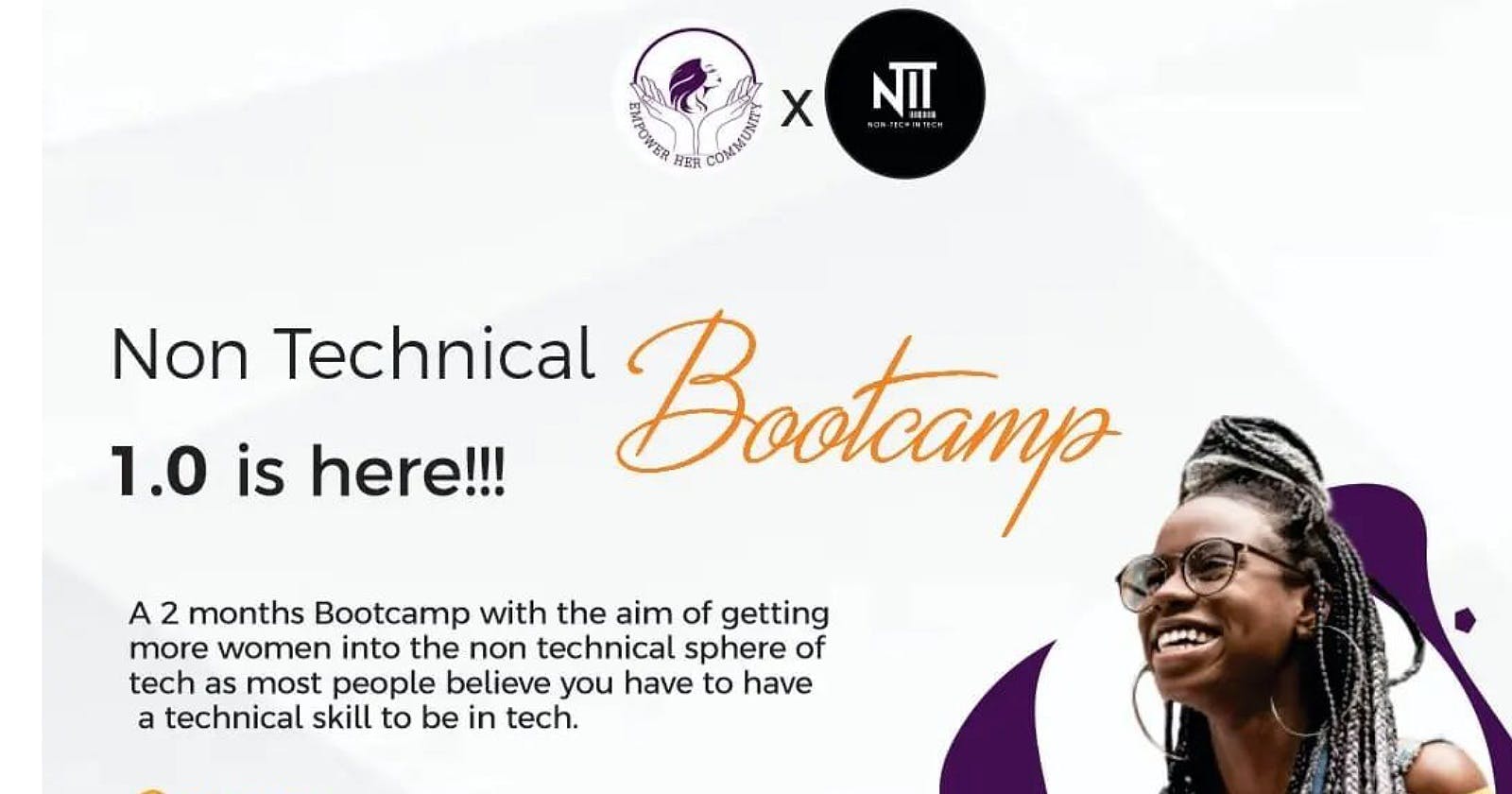My Experience at the Empower Her X Non-Tech in Tech Non-Technical Bootcamp
Four months ago, I applied to Empower Her X Non-Tech in Tech(EHC X NTIT) boot camp. I was accepted as a participant in the technical writing track on the 14th of July.

The EHC X NTIT boot camp had the following tracks
- Technical writing
- Digital marketing
- Product management
- Product marketing
- Customer success management
- Community management
- Content creating
- UX writing
Free non-technical boot camps are not easy to see these days so I decided to share my 6 weeks of class experience as a technical writing participant in a non-technical boot camp.
Week One: Introduction to Technical Writing
For the first week we did the following:
- What is technical writing
- The various areas of technical writing
- Various forms of technical writing
- Reasons why we should write
I learned the various skills a technical writer must have and some platforms where you can create a blog and start writing. I also met two of my facilitators Benny Ifeanyi Iheagwara and Blessing Ene Anyebe. For this week's task, we had to create a blog on either Medium, Hashnode, or Devto.
Week Two: Tools in Technical Writing
This week I learned about the various tools in technical writing which are;
- Research tools,
- Editing tools,
- Publishing tools
- Note-taking tools
- Documenting tools
- Authoring tools
- Media tools
- Collaborative and management tools
I also learned what markdown is and how you can implement it as a technical writer. Our task for this week was to choose a topic of your choice and write on it but not publish it.
This was my most challenging week. I have never written an article before so I didn’t know how to go about it. This week's class was taught by Pelumi Eyitimonwa, our 3rd facilitator.
Week Three: Article Reviews
The articles we wrote for the week two task were reviewed this week. I had my article reviewed, I learned from not just my mistakes but from others' mistakes and I started using some editing tools like Grammarly and Quillbot.
I also published my first article on Hashnode. You can check it out here
Week Four: Search Engine Optimization(SEO) in Technical Writing
I learned the following:
- What is SEO
- Three types of SEO which are;
* On-page SEO(which is mostly implemented by technical writers) * Off-page SEO * Technical SEO - Why SEO is important
- How to optimize in technical writing and some SEO tips.
As compared to the previous weeks, this was my best because I did not experience any network issues so listening in class was not a difficulty.
Week Five: Documenting Application Programming Interface (API)
This part came as a surprise to me as someone who programs a lot. I know what an API is but I would have never imagined that Technical writing uses APIs too. Technical writers don't develop APIs they just use already developed APIs by programmers which may require some knowledge of programming languages such as
* Html
* CSS
* Javascript
Light Segun our 4th facilitator taught this class and he did an amazing job.
Week Six
Part One: Open-Source Contribution as a Technical Writer
This is where most people may think open source contribution is only for programmers. But technical writers also have their part in open-source contributions. I learned about some platforms where you can contribute as a technical writer and get paid such as Outreachy and Google season of Docs. And you can even write for some communities such as Freecodecamp
Part Two: The Real World and Final Projects
For the last class of the last week, we had to choose a single topic amongst various topics given to us and write about it as our final project for the boot camp.
I chose to write about my experience because technical writing has so many parts to it that a lot of people may not know about, especially those that want to start a career in technical writing. We were advised on how to get clients and work with clients.
Additional Things I Learned
- Being a technical writer you can get ideas at any time. So it is very important to always have a book and a pen or any other resource you can use to write down these ideas.
- Create a good portfolio and resume.
- Join technical writing communities such as Write the Docs.
- How to freelance as a technical writer.
- How to ace technical writing interviews.
- When you want to write an article, it is always good to use Google Docs before editing it and then, finally publishing it on your blog
- Have a particular writing style that uniquely identifies you.
Resources
You can get access to so much more using this link.
Start your technical writing journey here
Conclusion
There is a lot to learn as a technical writer. From my experience, I realized that technical writing also has its equations that you can master if you are consistent enough. I hope from my experience you will be able to start your own journey or learn more. If you reach this point of my article thank you for reading till the end.
Shout out!!
Thanks to my amazing facilitators Light Segun, Pelumi Eyitimonwa, Benny Ifeanyi Iheagwara, and Blessing Ene Anyebe for making the journey easier.
Most especially thanking Empower Her Community and Non-Tech in Tech community, especially the founders Elizabeth Okaome and Peace Obinani for allowing me to be part of this journey.
Thanking Tracy Obakhena and Awoyemi Ifeoluwa for always checking up on us and encouraging us to keep moving.
I look forward to using this knowledge to build a great career in technical writing. Thank you so much I will forever be grateful for this opportunity.
